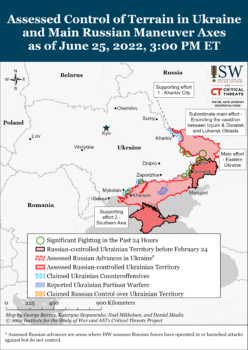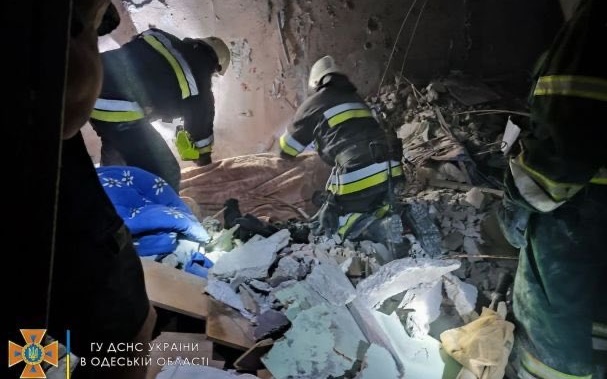Rescuers dig through rubble of a residential building destroyed by a Russian missile in the Odesa region in southern Ukraine, July 1, 2022
“Ukraine Remains Defiant”: What’s Next in Putin’s War
Friday’s Coverage: Russia Kills 18 Odesa Civilians After Withdrawing from Snake Island

Source: Institute for the Study of War
UPDATE 1344 GMT:
Seeking to overrun Lysychansk, the last Ukraine-held city in the Luhansk oblast in eastern Ukraine, Russian forces have stepped up their intense bombardment of the area.
Luhansk Governor Serhiy Haidai, the governor of the Luhansk region, wrote:
Private houses in attacked villages are burning down one by one. With such a high density of shelling, we only have time to shelter the injured. Fires simultaneously in several places. We barely have time to eliminate large-scale fires in Lysychansk.
The Ukrainian army rejected claims by Russian proxy forces that they have surrounded the city.
Ruslan Muzytchuk, a spokesman for the Ukrainian National Guard, said, “Fighting rages around Lysychansk. Luckily the city has not been encircled and is under control of the Ukrainian army.”
UPDATE 1059 GMT:
In his nightly video address to the nation, Ukraine President Volodymyr Zelenskiy focused on Russia’s mass killing of civilians with missile strikes on the Odesa region:
I emphasise: this is an act of conscious, deliberately targeted Russian terror — and not some kind of mistake or an accidental missile strike.
Nobody was hiding any weapons, any military equipment. Regular people, civilians, lived there.
UPDATE 0658 GMT:
The US assesses that Russia does not have enough occupying forces to control the Kherson region in southern Ukraine.
An American official cited Ukrainian partisan operations, including assassination or attempted assassination of three Russian proxy officials, and counter-attacks by the Ukraine military regaining some territory.
Avril Haines, the Director of National Intelligence, said Wednesday that Russia “faces rising partisan activity in southern Ukraine”.
On June 16, a car bomb targeted Eugeniy Sobolev, the head of the prison service, who was hospitalized. On June 24, Dmitry Savluchenko, in charge of the Department of Youth and Sports for the Kherson region, was killed. On Tuesday, the car of a third Russian proxy official was set on fire in Kherson.
UPDATE 0646 GMT:
The Kremlin is proposing “special measures in the economic sphere” commanding Russian businesses to supply military operations.
The Kremlin’s amendment of federal laws prohibits businesses from refusing state orders for special military operations. It permits the Kremlin to change employee contracts and work conditions, including the requirement for workers to continue during the night or federal holidays.
The Kremlin said the Ukraine invasion has exposed supply shortages, specifically materials needed to repair military equipment, so Russian officials must “concentrate their efforts in certain sectors of the economy”.
UPDATE 0636 GMT:
Russia proxy authorities have charged two more UK nationals, Andrew Hill and Dylan Healy, with fighting as mercenaries.
The charges, with “forcible seizure of power” and undergoing “terrorist” training, raise concerns that the two could face execution.
Britons Aiden Aslin and Sean Pinner and Moroccan Brahim Saadoun were condemned in Russian-controlled Donetsk in eastern Ukraine last month. Aslin and Pinner have filed appeals.
Hill was captured in late April. He has been paraded on Russian TV several times, including an appearance with the headline: “Exclusive – Before The Execution”, while seriously injured.
Healy was working in Ukraine as a humanitarian aid volunteer. He and another UK national, Paul Urey, were reportedly detained near Zaporizhzhia in southern Ukraine while driving to help a woman and two children evacuate the Russian-occupied area.
UPDATE 0624 GMT:
The US is sending Ukraine another $820 million in military aid.
The package include new surface-to-air missile systems and counter-artillery radars to counter Russia’s long-range strikes, up to 150,000 rounds of artillery ammunition, and ammunition for medium-range rocket systems delivered in June.
The Pentagon is also providing two Norwegian-developed anti-aircraft systems, NASAMS, which are used to protect airspace around the White House and Capitol in Washington.
The US has committed more than $8.8 billion in weapons and military training in 14 packages since August 2021.
UPDATE 0613 GMT:
Almost three dozen leaders of Russian weapons manufacturers and at least 14 defense companies have not yet been sanctioned by the international community over Vladimir Putin’s invasion of Ukraine and the mass killings of civilians.
Among those who have escaped punishment is Alan Lushnikov, who owns 75% of Kalashnikov Concern JSC, the original manufacturer of the AK-47 assault rifle. The company has been sanctioned since 2014, and Russia’s seizure of Crimea, by the US. The European Union, and the UK added their sanctions this year.
Kalashnikov Concern makes 95% of Russia’s machine guns, sniper rifles, pistols and other handheld firearms. It also produces missiles that can be fired from aircraft or on land.
Almaz-Antey Concern, which specializes in missiles and anti-aircraft systems, has been sanctions, but CEO Yan Novikov has not.
UPDATE 0554 GMT:
Ukraine President Volodymyr Zelenskiy has sought support from Latin America’s leaders against the Russian invasion.
Zelenskiy wrote after his call, “I continue to establish relations with an important region — Latin America.”
Friday’s conversations with Argentina’s Alberto Fernández and Chile’s Gabriel Boric follow discussion with Ecuador President Guillermo Lasso and Guatemalan President Alejandro Giammattei just over two weeks ago.
The Argentine Government said Fernández, in the 35-minute call, offered help in any negotiations with Russia.
Boric wrote that “expressed my solidarity and our willingness to support the condemnations of the invasion in international organizations,” saying Ukraine “has a friend in South America”.
ORIGINAL ENTRY: Angered over their retreat from the strategic Snake Island in the western Black Sea, Russian forces killed 21 civilians in the Odesa region in southern Ukraine on Friday.
Another 38 people were injured in the attacks on a residential apartment and a holiday resort in the village of Serhiyivka. Two children were killed. Seven children and a pregnant woman are among the injured.
Almost all of the casualties were in the destroyed residential building. Three people, including a 12-year-old boy, were killed and one person wounded in the resort.
Ukraine Foreign Minister Dmytro Kuleba condemned the mass killing and appealed for anti-missile defense systems from the international community.
Terrorist state Russia continues its war against civilians with overnight missile strikes on Odesa region killing dozens, including children. I urge partners to provide Ukraine with modern missile defense systems as soon as possible. Help us save lives and put an end to this war. pic.twitter.com/SQP6UUkNlf
— Dmytro Kuleba (@DmytroKuleba) July 1, 2022
The Russians also fired incendiary phosphorus munitions on Snake Island, according to the Ukraine military: “Today at around 18:00…Russian air force SU-30 planes twice conducted strikes with phosphorus bombs on Zmiinyi island.”
The attack undercut the propaganda of the Russian Defense Ministry that the retreat from Snake Island — after weeks of Ukrainian attacks destroying ships, weapons, and facilities — was “a gesture of goodwill” to allow shipping of grain from Ukraine.
The Ukrainian army noted the Russians were unable to “respect even their own declarations”.
Russian State media did not mention the retaliatory mass killings of Odesa’s civilians.

